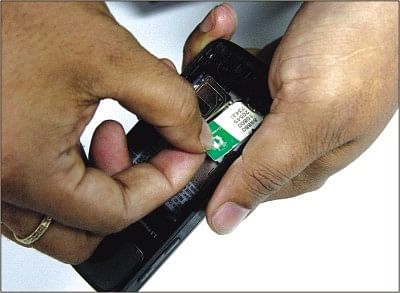Local firm shows feat in making SIM cards

A man inserts a SIM card into his mobile phone. A local company has so far made four million SIM cards for mobile operators in the country.Photo: STAR
Silkways Card & Printing Ltd, a local company, has made around 4 million subscriber identity module (SIM) cards since 2007 at its own plant for the country's mobile phone operators, a testimony to the capability of domestic enterprises.
From 2006 the company also has supplied 40 million scratch cards used for recharging balance in mobile phones.
The figure could be insignificant in the rapidly growing 45-million mobile market, but the local initiative has already been able to gain confidence in both the national and multinational cellphone companies.
The company, formed in 2006, started SIM manufacturing at its Tk 50 crore Tejgaon plant with German machinery although it needs to import chip, one of the major components of a SIM card.
"Besides chip, we do everything for making SIM cards in our lab -- from assembling chip to installing required software," said Masudur Rahman Tuhin, chief operating officer of the company, yesterday.
"It's a no-nonsense company," he said, adding that Silkways is recognised by ISO (International Organisation for Standardisation) and GSM Association, the global platform of mobile technology.
In 2007 and 2008 Bangladesh's six mobile operators, who usually import SIM cards, sold around 10.27 million SIM cards, of which Silkways supplied around 40 percent.
Grameenphone, majority controlled by Norway's Telenor, AKTEL, majority owned by Telekom Malaysia, and state-run TeleTalk are the customers of the company.
The local and multinational operators import SIM cards at an average cost of $2.5 each. Silkways claims that it sells the same quality SIM at half this import price.
Silkways, a 200-person strong company with the capacity to produce 2 million SIM cards a month, imports ABS sheet and then install chip for making the SIM cards.
But the company is faced with setback due to poor customer acquisition by the operators in the recent time, and the operators' unwillingness to buy the same quality SIM cards from local market for unknown reasons, the official said.
He said the company is yet to reach the break-even point and blamed the situation on a lack of government's policy support.
"We save foreign currency, which operators remit by purchasing SIM cards from the global market," Masudur Rahman said, adding: "If the government considers the foreign currency issue and encourages the operators, especially the local one, we can sustain our growth."
The country's telecommunication penetration rate is only 30 percent now and so there remains a big untapped market. As per the market insiders' projection, the number of telecom customers would be 50 million by the end of this year.
[email protected]

 For all latest news, follow The Daily Star's Google News channel.
For all latest news, follow The Daily Star's Google News channel. 


Comments